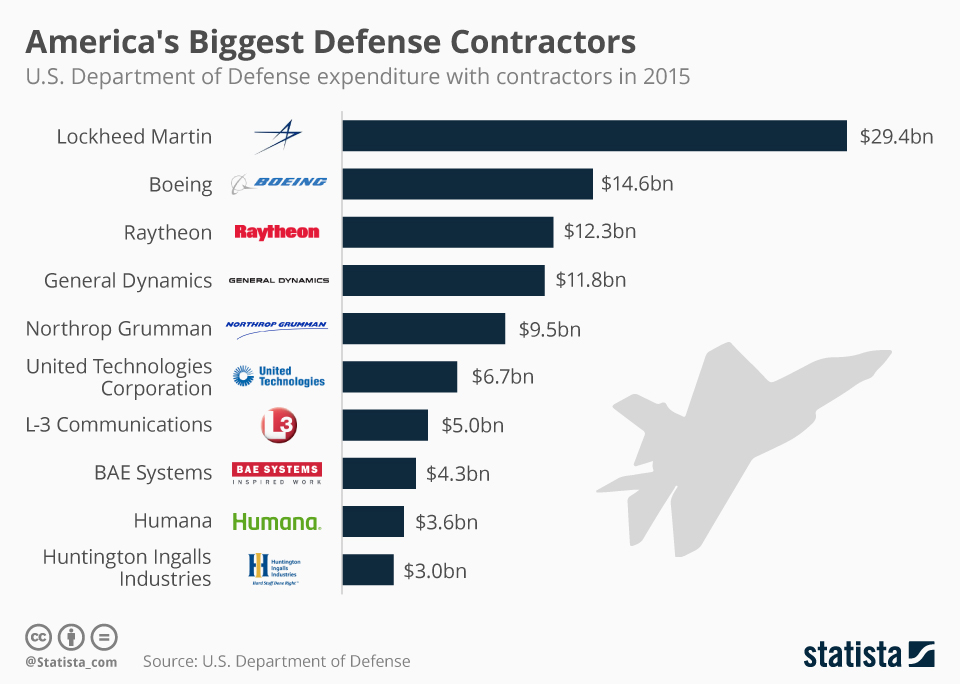Advancing Locust: The Need to End U.S. Forever Wars

If we are to survive we need to put an end to the US forever wars. Defensive wars have reasons but the US wars of aggression benefit business, the US military and its contractors, think tanks, even universities.
US wars involve the federal government and other governmental institutions in nurturing wars within a war economy that enriches death merchants and costs destruction and millions of lives all over the world. A dominant US war economy limits possibilities for any economy of peace, and brings decadence and impoverishment to US citizens while favoring societal decay. Worse, the US forever wars are expanding to include the biggest investment groups so they make money out of destruction/reconstruction that includes the privatization of entire countries.
Professor Joseph H. Chung, in America’s Perpetual War published by Global Research reminds us what President Carter said in 2018: the US has been at war for most of its existence. Since WWII US wars of aggression are organized by and for the benefit of specific groups and have strong negative impacts on US society. Chung argues that wars will continue unless the US is stopped. Since WWII the US has been involved in 23 invasions, 7 “civil wars” and 2 multi-target wars.
The invasions include:
- the Korean War (1950-1953),
- the Vietnam War (1955- 1975),
- the Cuban Bay of Pigs (1961),
- Lebanon (1982-1984),
- Grenada (1983),
- the bombing of Libya (1984) and
- the wars against Libya (2011, 2015-2019),
- the Tanker War-Persian Gulf (1984-1987),
- Panama (1989-1990),
- the Gulf War (1989-1991),
- the Iraq Wars (1991-1993, 2003-2011, 2014-2021),
- Bosnia (1992-1995),
- Haiti (1994-1999),
- Kosovo (1998-1999),
- Afghanistan (2001-2021),
- Yemen (2022-now),
- Pakistan (2004-2018),
- Somalia (since 2007),
- Niger (since 2013),
- Syria (since 2014).
The seven civil wars include:
- Indo-China (1959-1975),
- Indonesia (1958-1961),
- Lebanon (1958),
- Dominican Republic (1966-1968),
- Korea DMZ (1966-1969),
- Cambodia (1967-1975), and
- Somalia (since 1991).
And the two multi-target wars are
- Operation Ocean Shield, in the Indian- Ocean (2008-2016) and
- Operation Observant Compass in Uganda and Central Africa (2011-2017). (1)
US wars, organized by the American Pro-War Community (APWC) includes at its core US war corporations (Lockheed Martin, Raytheon, Boeing, Northrop Grumman, General Dynamics) selling 75% of the weapons used, but also the US federal government (Pentagon, Congress, Senate and other government agencies) and known US universities. The Boston College works with the Air Force, the University of Massachusetts Lowell with the Army, while Tufts University improves soldiers cognitive and physical performance, MIT is itself a war corporation, and Columbia and Brown develop the DARPA engineering system. Princeton produces hardware, Dartmouth sells machine learning, Pennsylvania works in artificial intelligence and Stanford develops technology for chemical warfare. Harvard does educational materials and human resources for war industries but also produced the napalm bomb used in Korea, Vietnam and other wars while John Hopkins makes tools to evaluate offensive capability for battles. American universities are dependent on war money and have lost their mission. (1)

Under the nazis, Germany grew through a war economy requiring enemies to kill and places to invade. While in a peace economy demand generates supply in a war economy is supply what generates demand. The US war economy makes possible for war corporations to dictate demand by increasing supply and when supply growths it needs to be used. Enemies need to be found or created to use the supply against them. US ideologues work hard at this and come together within the so called “think tanks” that are funded by war corporations. A self-sustaining cycle emerges where think tanks identify/generate enemies and wars, among them the Centre for Strategic and International Studies, the Centre for a New American Security, the Hudson Institute, the Atlantic Council. Amanda Yee documents funding connections between war think tanks and military contractors. (2)

Pressure groups and the pro-war Media favor the US cycle of unending wars. Well connected pressure groups (the Aerospace Industrial Association, the National Defence Industrial Association or the political Action Committee) advocate for war. The US corporate Media is unlikely to challenge government and strongly pro-war because of its focus on money-making and limited concern for human rights or collective well being. CNN, MSMBC, Fox News, CBS News, NBC, the New York Times, the Washington Post, have strongly favored most US wars. All involved benefit from war, but none more than war corporations getting research grants, tax incentives, and juicy business contracts. Collusion between war corporations and the Pentagon emerges in connection to high contractual prices involved. Worse, the privatization of war favours a culture of corruption and bribes involving politicians and decision makers; the US has well known republican and democrat “money senators” -among the top Jeanne Shaheen, Lindsey Graham, Bill Nelson and departed John McCain. (1)
Challengers to the American Pro-War Community pay price for questioning argues Command Master Sargent Dennis Fritz who in 2024, 20 years after the Iraq war, published “Deadly Betrayal: The Truth About Why the United States Invaded Iraq.” His book documents how that US invaded Iraq on behalf of Israel, taking out the Iraqi government who funded Hamas and Hezbollah. Command Master Fritz decides to write his book concerned that the US is today in a situation similar to the one 20 years ago in Iraq. Israel is killing Palestinians in Gaza while Iran supports the Palestinian resistance. In 2004 the reasons adduced for the Iraq war were lies, he said, weapons of mass destruction were never found. At the time Fritz boss, Douglas Faith, was suspected of being a Israeli foreign agent at the heart of the Pentagon. He was the architect of the justification for the war against Iraq. Fritz knows that peace and negotiation were never given a chance -even when Saddam Hussein offered whatever the US wanted. He explains that Iraq became the “message” to Syria and Libya, Iran and North Korea. But Iraq cost 4500 American military lives and a million or more death and displaced, all based on lies. The lies are proved in the documents of the George W Bush administration. Rumsfeld believed in documenting all so the lies are in paper. The main reason for the war was proving the US strong, a sole power. Faith was probably a foreign agent of Israel but it cannot be proved, still Fritz witnessed Faith daily contacts with Bibi Netanyahu and the presence at the time, in and out of the White House, of many Israeli agents. (3)
The Cost of War, a project of Brown University, documents the costs of the post 9/11 wars in money, life and future financial obligations. Over 940 000 people died from direct violence and an estimated 3.6 to 3.8 million people died indirectly in post 9/11 war zones. The total deaths, 4.5 to 4.7 million people, include 432 000 civilians. There were 38 million war refugees and displaced persons in Afghanistan, Pakistan, Iraq, Syria, Libya, Yemen, Somalia and the Philippines. The US federal price tag was U$S 8 trillion. As many as 7050 soldiers died in the wars, and at least 4 times as many active duty personnel and war veterans of post 9/11 conflicts died of suicide, not in combat. Since the wars there has been an erosion of civil liberties and human rights in the US itself and abroad. (4)
In November 2023 Chris Hedges interviews Dennis Kucinich, the 1997-2013 US Representative from Ohio, he said: “Ingrained into our system is the funding of wars and a perpetuation of conflict because if you’re making all these arms material, you’ve got to use them…a continuous loop…of money pouring in.” The US is close to $1 trillion in the fiscal year of 2023 for the Pentagon plus the various intelligence services and in addition to a substantial discretionary spending source. We’re spending our national treasure on war: “We’re a war machine as a nation.” The US prefers war over healthcare, housing, education and the economic welfare of its citizens. “People is starting to see, but the last seem to be members of the US Congress.” (5)
Decisions to go or not to go to war, he points, are made at the administration level but there is a
“broad network of public policy groups masquerading as independent voices, think tanks, academic organizations, and people in the media who feed into any narrative that would prompt the country to start to rattle the sabers or determine, well, we need to go here in order to defend our national interest. Once that appropriation process starts…and they have close to $1 trillion in all accounts…That money…enables the US at this very moment to send two aircraft carrier units out into the area near Israel…to send troops anywhere they want in the world or to pay for the ones that are already stationed, and they put the country at the threshold of a war the minute they do that.” (5)
Kucinich argues the US faces an ideological mindset sponsored by the neoconservatives who see the US as a force fighting against “evil” all over the world.
“The struggle they invite is one of their own making, the desire to be able to create wars and to cash in. Some of the war contractors or those who hold them in a portfolio, cite what a great thing it is for the profits resulting of what’s happening in the Middle East right now. We are in this cycle, we have a war-dependent economy and the more we spend on war the more likely we are to go to war. The more people we have in bases around the world, the more likely we are to go to war…This seemingly inexorable march of nuclear folly may pit the US militarily against China, Russia, and their allies.”
In his view, only increased citizen involvement in the US challenging and braking the war-loop could solve it. (5)
For ordinary people nothing is good about war. Once a war its over the human and economic costs of it continues for decades and some, like the financial cost of US veterans’ care will not peak until mid-century. The ripple effects of war on the US economy have been significant, including job loss and interest rate increases. Contrary to the widespread belief that war creates jobs, US federal spending on the wars would have led to at least 1.4 million more jobs if the money been invested instead in education, health care or green energy. The hundreds of billions of dollars invested in military assets —ships and aircraft— during the first decade of the wars would have led to larger capital improvements had these dollars instead been invested in core public economic infrastructure, such as roads and water systems. The wars have impacted interest rates charged to borrowers by banks and other creditors because war spending was financed entirely by debt, contributing to a higher ratio of national debt to Gross Domestic Product (GDP) and rising long-term interest rates. (6)
A peace economy would be a far better option for US citizens, but it is not favored because it is not US citizens who current politicians and power brokers represent, and for profit makers wars work. The profits of war are extending, unfortunately, beyond war corporations. Ukraine highlights the possibility that war is used to “privatize” entire countries, this is Michel Chossudovsky. He challenges the understanding that the US has “lost so many wars,” arguing that US wars were never about “winning” but about “destroying” selected enemies. From this perspective he argues that even Vietnam, a war won by the efforts of the Vietnamese people, was actually lost. Vietnam never received war reparations payments from the US for the massive loss of life and destruction; in 1993 the agreement reached in Paris forced Hanoi to recognize the debts of the Saigon regime of General Thieu; thus, in many ways, forcing Vietnam to compensate Washington for the costs of war. (7)
The neoconservative (Neo-Con) agenda embedded in America’s military and intelligence agenda is to “destroy” countries, a profit-driven goal where destruction leads to reconstruction. An engineered economic and social destruction of sovereign nation states, leaves room for creditors to pick up the pieces while appropriating for themselves of real wealth. This agenda can be pursued through “regime change,” “color revolutions,” or “war.” The goal is the demise and criminalization of the state and the imposition of strong economic medicine and soaring dollar denominated debt. (7) A predatory agenda that turns states into slaves.
Image: Euromaidan in Kyiv, December 2013. Protesters with OUN-B flag. (Licensed under CC BY 2.0)

The Euromaidan Coup d’ Etat of 2014 in Ukraine was supported by the US as first step to trigger a crisis in commodity trade and dislocation of all sectors of economic activity impoverishing Ukraine. A broken-down nation, with an external debt of 150 billion in 2023, was “saved” by the Biden administration granting 75 billions in military aid. This increased Ukrainian debt and pushed it to war. Before Ukraine, the IMF imposed its strong economic medicine through debt conditionalities. Since 2022 the goal is direct Ukraine privatization (a corporate takeover and appropriation of an entire country). In Ukraine, Blackrock (the largest portfolio investment company) and JP Morgan work together, playing the “supporting role” in setting the Ukraine Reconstruction Bank -a “tremendous” opportunity for private investors, in their words. War is good for business and the greater the destruction the greater the profits, also the hold of private investors in Ukraine. (7)
It is time for the world to open its eyes and deal with the criminal intent and predatory goals of US forever wars. The locust are upon us, their intentions are global, none of us is safe. The US unleashed gigantic predatory forces that believe themselves invincible, and are voracious in their appetite for money, power and control. Returning the evil genie to the bottle will not be an easy task, it requires unity of purpose and lots of courage. Resistance is not futile: resistance is mandatory. Be informed of empire strategies and goals and do all you can to frustrate them. It is our world not theirs.
*
Click the share button below to email/forward this article to your friends and colleagues. Follow us on Instagram and Twitter and subscribe to our Telegram Channel. Feel free to repost and share widely Global Research articles.
One Month Before Global Research’s Anniversary
Nora Fernandez is a member of the Executive of Canadian Network on Cuba and Nova Scotia Cuba.
Notes
[1] Joseph H. Chung, America’s Perpetual War: Six Questions. Who are the Beneficiaries of American wars? Global Research, initially published June 12, 2023 and republished this past August 14.
[2] Amanda Yee, Six War Mongering Think Tanks and the Military Contractors that Fund them, March 7, 2023. Six war mongering think tanks and the military contractors that fund them – Liberation News
[3] Denniz Fritz, Beyond Betrayal: The Truth About why the United States Invaded Iraq.” 2023, Current Affairs, podcast interview (See this)
[4] The Cost of War Project, Summary of Findings.
[5] Chris Hedges, “We’re a war machine as a nation:” The truth about American politics, November 3, 2023. Interviewing Dennis Kucinich. The Real News Network
[6] The Cost of War Project, The US Economy
[7] Michel Chossudovsky, Substack, Ukraine. What is the end game? The privatization of an entire country.


No comments:
Post a Comment